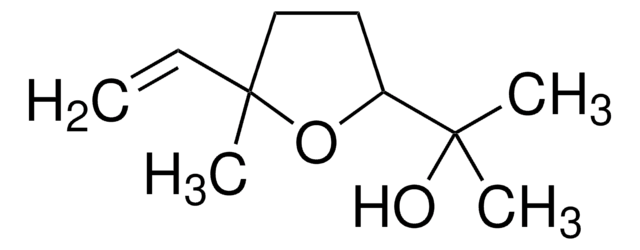Wichtige Dokumente
W374600
Linalooloxid
natural, ≥95%
Synonym(e):
2-(5-Methyl-5-vinyltetrahydro-1-furyl)-2-propanol
About This Item
Empfohlene Produkte
Qualität
Fragrance grade
Halal
Kosher
natural
Qualitätsniveau
Agentur
follows IFRA guidelines
Einhaltung gesetzlicher Vorschriften
EU Regulation 1223/2009
Assay
≥95%
Grünere Alternativprodukt-Eigenschaften
Less Hazardous Chemical Syntheses
Use of Renewable Feedstocks
Learn more about the Principles of Green Chemistry.
sustainability
Greener Alternative Product
Brechungsindex
n20/D 1.452
Dichte
0.945 g/mL at 20 °C (lit.)
Anwendung(en)
flavors and fragrances
Dokumentation
see Safety & Documentation for available documents
Nahrungsmittelallergen
no known allergens
Allergener Duftstoff
no known allergens
Grünere Alternativprodukt-Kategorie
Organoleptisch
citrus; cooling; floral
SMILES String
CC(C)(O)C1CCC(C)(O1)C=C
InChI
1S/C10H18O2/c1-5-10(4)7-6-8(12-10)9(2,3)11/h5,8,11H,1,6-7H2,2-4H3
InChIKey
BRHDDEIRQPDPMG-UHFFFAOYSA-N
Suchen Sie nach ähnlichen Produkten? Aufrufen Leitfaden zum Produktvergleich
Allgemeine Beschreibung
Haftungsausschluss
Signalwort
Danger
H-Sätze
Gefahreneinstufungen
Acute Tox. 4 Oral - Skin Corr. 1B
Lagerklassenschlüssel
8A - Combustible corrosive hazardous materials
WGK
WGK 2
Flammpunkt (°F)
163.4 °F - closed cup
Flammpunkt (°C)
73 °C - closed cup
Hier finden Sie alle aktuellen Versionen:
Besitzen Sie dieses Produkt bereits?
In der Dokumentenbibliothek finden Sie die Dokumentation zu den Produkten, die Sie kürzlich erworben haben.
Unser Team von Wissenschaftlern verfügt über Erfahrung in allen Forschungsbereichen einschließlich Life Science, Materialwissenschaften, chemischer Synthese, Chromatographie, Analytik und vielen mehr..
Setzen Sie sich mit dem technischen Dienst in Verbindung.










